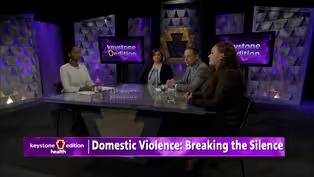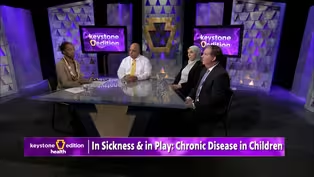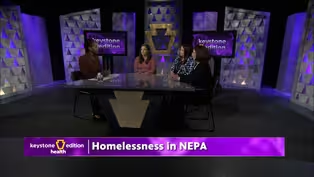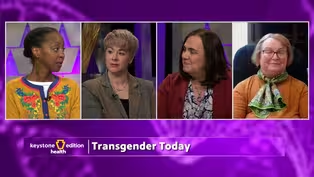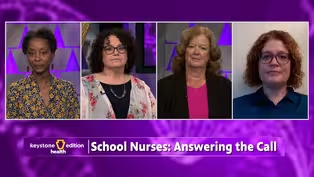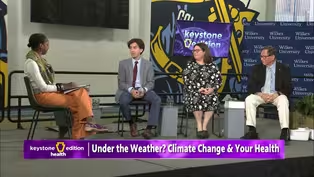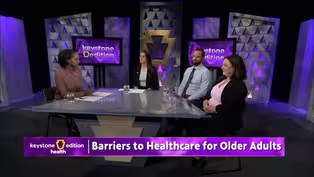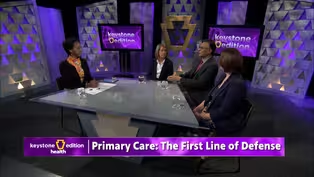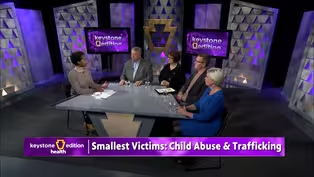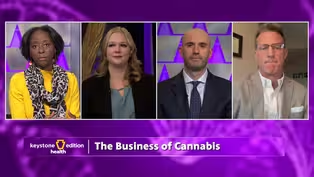Keystone Edition
Child Care Challenges
2/28/2022 | 26m 59sVideo has Closed Captions
What new challenges has child care presented amid the COVID-19 pandemic and regular cold a
Schools and daycares are full of children once more, but have all had to adapt to changing health concerns in order to remain open and able to care for students. What new challenges has child care presented amid the COVID-19 pandemic and regular cold and flu seasons? Find out what centers are doing to keep children safe and healthy.
Problems playing video? | Closed Captioning Feedback
Problems playing video? | Closed Captioning Feedback
Keystone Edition is a local public television program presented by WVIA
Keystone Edition
Child Care Challenges
2/28/2022 | 26m 59sVideo has Closed Captions
Schools and daycares are full of children once more, but have all had to adapt to changing health concerns in order to remain open and able to care for students. What new challenges has child care presented amid the COVID-19 pandemic and regular cold and flu seasons? Find out what centers are doing to keep children safe and healthy.
Problems playing video? | Closed Captioning Feedback
How to Watch Keystone Edition
Keystone Edition is available to stream on pbs.org and the free PBS App, available on iPhone, Apple TV, Android TV, Android smartphones, Amazon Fire TV, Amazon Fire Tablet, Roku, Samsung Smart TV, and Vizio.
Providing Support for PBS.org
Learn Moreabout PBS online sponsorshipMore from This Collection
Healthcare is constantly changing as technology finds new and better ways to help people live longer, healthier lives. Host Tonyehn Verkitus will address the issues that are important to the people in our community, including the ongoing pandemic, concerns about vaccines, food deserts, childhood trauma and child abuse, mental health, environmental issues, and the rising cost of staying healthy wit
Domestic Violence: Breaking the Silence
Video has Closed Captions
Access to the right resources can make facing this challenge a little easier for families (26m 59s)
In Sickness and in Play: Chronic Disease in Children
Video has Closed Captions
About 25% of children in the US aged 2 to 8 years have a chronic health condition (27m)
Video has Closed Captions
Homelessness can happen to anyone at any age or socio-economic status. (26m 59s)
Video has Closed Captions
As we raise the visibility on Transgender young adults and embrace them within our culture (26m 59s)
Video has Closed Captions
Obesity is a serious risk factor many try to avoid when developing healthy eating habits. (27m)
School Nurses: Answering the Call
Video has Closed Captions
What can our school districts do to help retain and recruit nurses for future generations? (27m)
Under the Weather? Climate Change & Your Health
Video has Closed Captions
How does climate change impact individual and public health? (54m 59s)
Barriers to Healthcare of Older Adults
Video has Closed Captions
What progress have local organizations made in addressing these challenges? (27m)
Primary Care: The First Line of Defense
Video has Closed Captions
When was the last time you saw your primary care doctor? (27m)
The Smallest Victims: Child Abuse & Trafficking
Video has Closed Captions
What are the signs to know to spot child abuse and even possible trafficking? (27m)
Dental Care: Brushing Up on Your Health
Video has Closed Captions
How can providers make dental care more affordable and accessible? (26m 59s)
Video has Closed Captions
What does the cannabis industry mean for Northeastern and Central Pennsylvania? (26m 59s)
Providing Support for PBS.org
Learn Moreabout PBS online sponsorship- [Narrator] Live from your Public Media Studios, WVIA presents Keystone Edition Health, a Public Affairs Program that goes beyond the headlines to address issues in Northeastern and Central Pennsylvania.
This is Keystone Edition Health and now moderator Tonyehn Verkitus.
- Good evening and welcome to Keystone Edition Health I'm Tonyehn Verkitus.
Tonight we'll look at how Childcare Centers have adapted to keep their doors open in a world of changing health issues and concerns.
WVIA's Paul Lazar has more.
(metal sound) - [Paul Lazar] Childcare centers may know how to weather flu seasons and stomach bugs, but today's world offers new health challenges around every corner.
Since the start of the COVID 19 pandemic childcare centers and schools have adapted to shifting social distancing and masking guidelines to keep children safe and reopen for in-person care.
Federal grants, like the Cares Act, offer financial support or centers to purchase health and safety equipment, staffing shortages, and quarantine guidelines can still cause concerns about whether or not a childcare center will be able to stay open every day.
For Keystone Edition Health, I'm Paul Lazar.
- Joining us tonight, we have Kelly Langan Director of children and teens for United neighborhood centers.
Tracey Campanini deputy secretary of the office of child development and early learning is with us in the studio.
And finally, Priscilla Riley of Pocono counseling is with us virtually as well.
Thank you all for joining us.
- Thanks for having us.
- Having us.
- So, as we all know, COVID has posed some challenges for everyone, but I think more specifically in childcare, we're seeing a lot of change and children not even being able to go to care and then parents not being able to go to work.
So I'm really excited to have this conversation today.
Kelly, can we start with you telling us a little bit about how many centers and programs you're running, how many children you serve?
- Sure, so at United Neighborhood Centers, we have three childcare centers across Scranton and there are varying sizes.
We serve children from three to 13, they're all rated star four using the Keystone quality improvement rating scale, which is the highest rating that Pennsylvania offers.
So we're really proud of that.
Before the pandemic, we were serving about 270 children, but currently we're serving about 125 with 19 early childhood educators.
- Priscilla, can you tell us a little bit about why childcare is so important for children, how it helps them develop mentally and also with mental health?
- Right.
Well, we know that development happens not just with the individual, but in social settings and kids especially need others to grow and to learn.
So in terms of being with their parents, that's fine.
That's their primary source of learning how to manage emotions and learning how to interact with others.
But it is very well known that children need to be in the company of other people in order to learn how to manage emotions and interact appropriately through play and through regular life skill activities.
- So how might being removed from daycare suddenly affect a child?
- I've literally had children as young as two years old and some school-aged kid, you know, 10, 13 years old, anxious and depressed.
It is a loss for them.
Unfortunately, sometimes the greatest contacts they have are in their day cares and in their school settings, that's their family for all intents and purposes.
The only contact they might have is with other kids in school and in daycare settings.
So it hasn't been unusual for kids to just kind of go into a sort of mourning process because of the loss and the isolation.
- Tracey, tell us a little bit about what your office does and how you support childcare center.
- Certainly, so the office of child development and early learning are active because people know Aspire Acronym, is the state agency that's responsible for licensing childcare centers.
We're also the agency in the Commonwealth that supports the Keystone Stars Initiative, which Kelly mentioned, and that supporting providers, as they actively try to prove the quality of their childcare centers.
Our office also supports early intervention services for children, birth through five, as well as the state's investment in Pennsylvania, pre-K counts, had started home visiting.
So we have a number of different ways that we're supporting providers with policy setting, with information resources, and most lately with some of the federal stimulus money that we been able to distribute on behalf of the Commonwealth.
- Can you tell me a little bit about how this star rating system works?
So when my kids were going to childcare, I didn't realize this was something that I should be looking for, but apparently this is rather important.
And how do people acquire a star four rating?
- Certainly, so Keystone stars is really a strategy for us to do two.
One is a Consumer Education for families and for other people looking to interact with childcare and the star system is based on increasing quality standards based on research or commonly accepted best practices.
Providers can choose to participate in Keystone stars and complete those activities to help them be designated at a star two, three or four.
The purpose of that is really to help parents.
If they're trying to make a choice about some of the activities, to be able to review that information and then make the choice that best suits their needs.
And we're hoping that they understand stars and choose a higher quality setting.
- Now daycare is childcare center, sorry.
- That's okay.
- Have always been rather vulnerable, but COVID has exacerbated that.
Can you tell us how the pandemic has affected what's happening in the centers?
- Sure, it's been, you know, just a process of adapting over and over and over again.
So when the pandemic first hit, we had to get a special waiver from the state to operate.
And so we were able to do that rather quickly.
We were closed for one day and then opened for essential workers.
And, you know, since then we've been building back the amount of families we're able to take on, but getting our numbers back to where they used to be has been really difficult.
And so from a financial standpoint, that is difficult, but then also the staffing has been difficult.
The challenges on staff have been difficult in that they all of a sudden had to support virtual school, which they'd never done before.
And so they were learning this whole new process that the teachers in the school district were learning.
The kids were learning and we were learning alongside with them.
And so that was a challenge.
And just now that school's in session, but sometimes virtual, we just need to constantly be ready to adapt and overcome and ready to staff the classrooms in a way that might be different than what we're used to.
- We stop by UNCs Bellevue Childcare Center to see what they're doing to adapt to these changing times.
(......) - We're at Bellevue Childcare Center.
It's a center that takes care of children from ages three to 13.
We offer a wide variety of supports to family and children as well.
It begins when the children walk through the door at the center, their parents can either use their phone or the bright wheel app that we just obtained through City Grant Funding.
Their child already has their mask on.
There are dots labeled on the floor.
So the child knows to stand three to six feet away from the other children.
They constantly are washing their hands, our preschoolers sing songs while they're washing their hands.
Our older children are counting.
They are amazing.
I have never seen children that have been able to keep their masks on all day long will notice during the day their masks are sliding down a little bit farther under their nose to their chin.
And you have to kind of give them that reminder.
Due to the pandemic a lot of our children have struggled to sit still.
So through the grant money as well, we were able to purchase a stepper when they get stressed out, they can come to my office, they get to go on the stepper, it's just that little break that they need to get out some of their emotion that they're having, that they can't express verbally.
We're also creating in each of the classrooms, a cozy corner, COVID has been tough on a lot of the older ones.
I'm not seeing it as much in the preschool because they don't know as much.
They're not used to what it was like prior to masking and things like that.
But our older children seem to need a break and a break away from their peers.
The oldest children do ask me probably once a week, is this gonna change?
Do we have to keep wearing the masks?
I know there's some things changing with the masks that they hear their parents talking about.
And they kind of ask us like, Hey, are we gonna change too?
And I'm honest with them.
I say, as soon as I know something, I'll let you know.
I don't think anybody's gonna know how to act.
- Tracey I know that Kelly mentioned they were only closed for one day.
You're probably saying lots of different things happening with childcare centers across the state.
Can you share some stories about the impacts that COVID has had?
- Sure.
So one of the things that's ongoing throughout COVID is the need to shut down a classroom or multiple classrooms when exposures and confirmed cases have been identified and that's really challenging for provider.
And it's challenging for families who need childcare because they need to get to work and trying to make some alternative arrangements.
Statewide we're seeing decreased enrollment.
Kelly spoke to that as well, where providers are not able to get back to their pre pandemic enrollment.
And that really impacts the revenue that they need to operate successfully and then the third place where we're really seeing big impacts is the availability of workforce that meets our qualifications to come into childcare facilities.
One for the wages that some child cares are able to offer are not really competitive with some of the new salaries that have been emerging since COVID has started and, or they might not have the qualifications.
And so providers might be experiencing just impacts from one of those things, or they might be experiencing impacts from all of those things.
- Priscilla, we spoken from the provider perspective.
Let's talk a little bit about what COVID is like from the children's perspective.
We did talk a little bit out anxiety and different things, but what sorts of behaviors are becoming more common as the pandemic goes on?
- I think that the key thing that you would wanna notice is that there's a higher level of acting out now because kids generally don't use feeling words until much older.
And so, because they can't say that they're sad or they're depressed or they're anxious, what we do see is more disruptive behavior, more attention seeking behavior parents kind of at the end of their rope, anxiety isn't necessarily fearfulness and worry, although it is that, but it's also not knowing what to expect and being worried about that.
I've seen previously pretty well adjusted children who weren't fearful prior to the pandemic begin to be very anxious about returning to the childcare settings and to the early childhood school settings.
And that has been unusual for me to observe is the level of anxiety of not wanting to go back or being afraid to return to in person.
- So imagining the fact that there may be these stops and pauses in care, I would imagine that they're also missing some social developmental milestones that would normally happen.
- Absolutely.
So, you know, So that's, that is the thing the continuity is so important and the consistency for that at learning curve to take place.
And so there have been just massive cuts in what should flow pretty naturally.
I've heard a lot of childcare workers and educators saying that in spite of the fact that let's say that they're working with a third grade class room, they're actually catering to a first grade, emotional and social skillset fights breaking out things like that.
Kids who haven't learned how to share, but yet are in a grade level where they are expected to share are not fist fight, and yet fights are raking out because they haven't gone through those social milestones to learn how to play nicely and to share, to ask an adult for help.
All of those things are happening and it definitely is stressful for the kids, the families, and for the staff that are working with them.
- If I may add to that, I I'll say that, you know, one of the things that we often do when we have children who are struggling with various behaviors is we try to offer them as much consistency as possible.
'Cause if they know what to expect, they're gonna be less fearful, less anxious.
And it's been so hard to do that with the staffing challenges because we're just filling in, you know, in various locations that all the time.
And so it can be really difficult to offer of the child, the consistency that they need to feel safe.
And so those behaviors are just increasing more and more and more, and it's, it's become a real challenge.
- So we're and.
- And adult coping skills are running thin.
- Right?
- So, you know, we're not doing well ourselves and yet we're supposed to keep it together and fake it and act like we have it together in front of a bunch of kids who are throwing themselves down on the ground and hitting their peers.
So you know, it's a challenge for the adults as well.
- You mentioned consistency and that brings to mind the fact that my girls today were told that they have the option to wear or not wear masks.
What do you expect to see in childcare centers?
And then when we're thinking about consistency, do we wanna just keep wearing the mask if we stop and then go back, what effect is that gonna have?
- You know, I'll say that for the three centers at United Neighborhood Centers, what we've been doing is just following the CDC guidelines and for childcare centers, specifically, the CDC guidelines are different than they are for schools, which sometimes parents and children struggle with.
And they'll say, well at the schools, they don't have to do that.
Or they're allowed back at school today.
Why can't they come back to childcare today?
And so we've been kind of unable to offer that consistency too.
But I mean my personal opinion is let's keep them on in the child care centers, if there's any chance of them coming back, because that back and forth is really hard for the kids.
- I think if I could add that is one of the most critical clarifications.
I would hope people walk away from the discussion is the guidelines that the CDC has issued for early care and education programs are different.
And that frustration for families and for providers and not understanding when they see a big public announcement.
And we haven't issued something from our office just to recognize that we're taking RQ from them and they might update it in a day or two, but they're being more thoughtful.
And I attribute that to the fact that most children that are attending childcare throughout the school year are under five and not yet eligible for the vaccines.
- So over the past 24 months, obviously you've had to adapt policies and procedures quite a bit, I would imagine.
So what does that look like as it unfolds from your office going down to the provider?
- So we really thought about some of the impacts that we could anticipate and trust me, we recognized that we didn't anticipate them all.
We attempted to look at those things that we thought would need to be regulatory suspensions that would provide some relief to childcare providers for the extent of the Public Health Emergency under the Governor's Disaster Proclamation.
We also tried to look at ways that we could keep funding flowing to providers, especially those that participate in our state subsidy program childcare works.
And so we continued to through the March through August period distribute funds based on the enrollment that the children had at the time, the pandemic stay at home orders were issued.
And then we were really blessed with the federal stimulus Cares Act, the Coronavirus Response Relief Act.
And now the American Rescue Plan that's really intended to get out into the hands of providers.
And so we've tried to put that out in a way that supports all providers across the Commonwealth and support them as sort of one time stimulus payments.
- And how has the cares act funding helped you.
- Tremendously?
It's helped us keep our doors open and that's, you know, that's, unfortunately the truth of it is that without that cares act funding, we wouldn't have been able to keep all of our staff on throughout the pandemic at United Neighborhood Centers.
We haven't had to let anyone go.
We've been able to retain all of our teachers and by retaining our teachers, that mean as soon as the kids were able to come back, we were able to have them in the classroom.
We didn't have to close classrooms.
So being able to pay their regular hours while we might not be operating regular hours.
And then also we've been able to, you know, purchase some stuff even recently, in order to help the children regulate those behaviors we were talking about.
So that's stepper at the Bellevue center has been fantastic.
We've only had it for a few weeks, but children are asking for it because they know that they're gonna explode soon and they just really need to, they need to let off some steam.
And so they're doing that and we're finding other ways to bring gross motor into the classroom instead of only when we're going outside or to the gym.
So that way that they have space, that they can go and safely let out some of that tension.
And we've also been able to set up for virtual learning, 'cause we know that it's gonna be a reality in some form kind of forever now, right?
And so we've been able to purchase different furniture so we can set up our classrooms differently so that they can safely distance while also engaging in their online classrooms.
If we have to do that.
- So obviously this cares act funding has supported a number of childcare centers, but I'm sure there are still some that have had to close their doors.
I'm sure either because of staffing or because of funds, what options are there for parents as childcare centers close and is there a place where they could go look to figure out who's available, who has space?
- So from our offices' perspective, we partner with 19 regional business partners known as The Early Learning Resource Centers.
And they serve as an information hub for families that are seeking childcare or other earlier learning options, as well as making eligibility determinations for those families to see if they're eligible for our subsidized childcare program for low income families.
So early learning resource center can be found if you sort of search that, on a public website and it will get you to the community that they're serving and they can help direct you.
The other place that we have is a public website called find childcare.pa.gov and families can get on and put search parameters in.
Maybe they're looking for a childcare provider that's closer to their employer, or perhaps they would like one closer to their home community.
They can set the features that they're looking for, whether they'd like a center or whether they'd like a family childcare home, what what's the best option to meet their needs.
And you we'll direct them to whether they're open.
And there's now a feature in there that will allow those providers to indicate whether they're accepting enrollments and displays vacancies that would help a family make some decisions.
- So Kelly, you have someone like Tracey in your corner.
- Yes.
- Helping you out, but how else can childcare centers, the providers advocate for themselves?
- You know, I think the most important thing is just for us to continue to ask for what we need, right?
And I think that goes all the way to the teachers.
The teachers need to ask for what they need from their supervisors.
Maybe they need a little extra time to themselves in a day to collect themselves or from the parents.
Maybe they need some more consistency and drop off and pick up times so that they know exactly how many kids, exactly what times they're going to have.
And you know, talking to the children, honestly, I think has been really helpful.
We all talk about our emotions now, a lot more in the childcare centers than we used to.
And we model that for the kids 'cause we know that that's been a challenge for them.
So coming in and being real with the children and saying, you know, I'm feeling really frustrated today.
And so I wanna let you all know that.
So maybe we could work on that together and you know, that's, that's been helpful.
So I think we, we just need to keep advocating for ourselves saying out loud, what we need working with our partners, working together to, you know, kind of get through this because we've weathered the storm so far, I'm sure we can make it through.
- Priscilla in talking about some of these behaviors we're seeing from children.
How can parents Kelly, just mentioned modeling, but how can parents actually help improve some of these behaviors at home as well?
- Absolutely, I was just gonna say Ditto Kelly.
And so I'm out, I don't have to say anything else, (laughing) but you know, absolutely.
The fact of the matter is that the first, the most powerful people in a child's life are their parents.
And so number one is that parents have to role model because they're being watched all the time and children naturally biologically are designed to imitate the adults around them.
So I do tell some, I do tell some parents that they really do have to lock it down and fake sometimes that they're calm while using their words, instead of having a tantrum themselves to show the child the appropriate way to express themselves.
The other thing I would say is that play is a child's work and they learn through play.
Therefore, if they're not going to a childcare center or school to do that with their peers, then parents really do need to do more than just cohabit with their kids.
And unfortunately, one of the worst things has been the fact that parents have had to work virtually from home while their kids are home.
And so by default, no one's fault.
It is what it is.
A lot of electronics have come into play, but there is nothing that we're are places, a parent paying attention and sitting down and engaging in play, even if it's just for a few minutes every day.
And during that time, giving a lot of nurturing, loving, and positive attention, we spend a large proportion of our day managing and telling our kids what to do or what not to do, telling them what they're doing wrong and what they should do instead.
And it's so much more important to hear what they're doing, right, to catch them being good, to praise them and reward them for all their positive moves.
And if you can at all ignore the junk behavior, if you can ignore the junk behavior, it absolutely goes away.
It may be frustrating to do it because parents wanna be on top of it.
But there's a lot of early childhood behavior that can be extinguished just by not attending to it and attending to the positive opposite structure too.
Our structure has fallen to the wayside and kids need the routine.
They need the predictability, even if they push against it, they really do need to know what's gonna happen for first and what's gonna happen second, what's gonna happen third.
And it's okay to set limits.
They need it.
They look for it.
It just shouldn't be harsh and punitive.
It should just be very matter of fact.
And then they feel safe and they know what to expect and they know their parents are in their corner.
- So Tracey, after this whole conversation, given the past 24 months, what do you see as the future for child care centers?
Like how are they gonna change?
What's gonna stay and what might still need improving.
- So I think as a result of the pandemic, one of the things on a systems level is really the understanding, about childcare as a part of our economy.
And that sounds so different from the things that we've been talking about prior to that question, because we're focused on, you know, supports to families and staff, and how childcare stays open.
But childcare is really fundamental for people to get to work.
And I think that during the pandemic business operators and owners have really come to understand that.
And so I think as we start to have conversations where we're advocating for what childcare needs, it's really much more easier or easy or understood by people in the community, whether it's business owners, legislators, people that didn't quite understand how important that was.
At the provider level we just continue to understand that they need more supports and how can we identify what those opportunities are to get those supports into their hands.
So we know this isn't over and we know there's continued opportunity to support them.
And we'll just look forward to what we can do to carve that out for them in the future and hear them.
I think that's also important.
- And Kelly, if you had one thing you could ask of parents during this time, what would that be?
- I would just say, you know, try, the more patient you are with your children, the more patient your children are going to be.
Right.
And so just pay attention, pay attention to those little moments.
And like Priscilla said, just praise them for even the little thing I see you standing and waiting so quietly right now while I'm working on this and I really appreciate it.
- I would like to thank all of our guests for joining us here on Keystone Edition Health I'm Tonyehn Verkitus.
Thank you and have a good evening.
(upbeat music)
Child Care Challenges - Preview
Preview: 1/21/2022 | 30s | Airs Monday, February 28th at 7pm on WVIA TV (30s)
Providing Support for PBS.org
Learn Moreabout PBS online sponsorship
- News and Public Affairs

Top journalists deliver compelling original analysis of the hour's headlines.

- News and Public Affairs

FRONTLINE is investigative journalism that questions, explains and changes our world.












Support for PBS provided by:
Keystone Edition is a local public television program presented by WVIA
